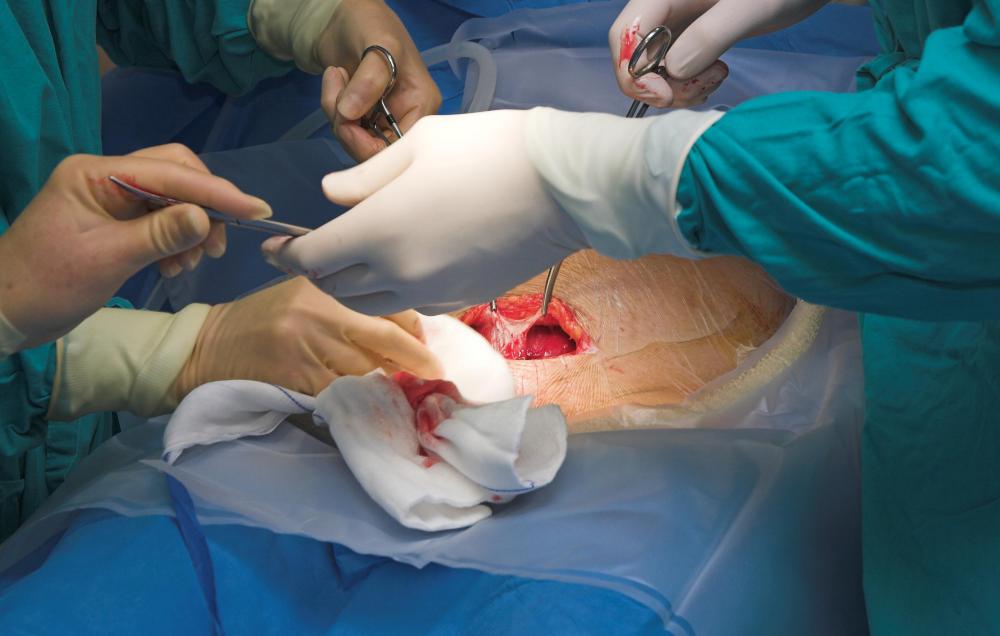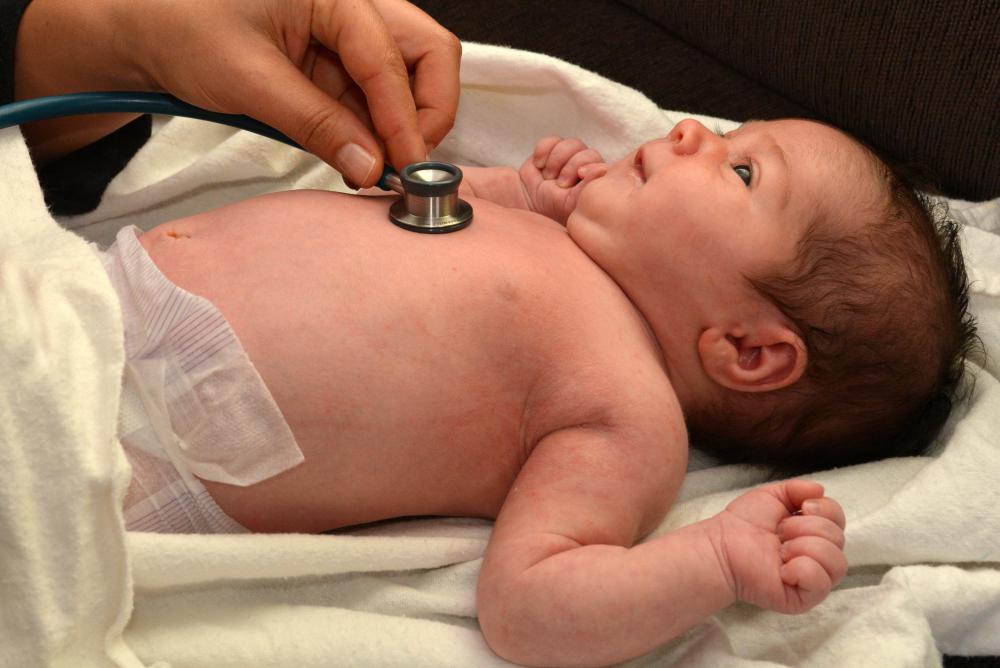At WiseGEEK, we're committed to delivering accurate, trustworthy information. Our expert-authored content is rigorously fact-checked and sourced from credible authorities. Discover how we uphold the highest standards in providing you with reliable knowledge.
What is Congenital Syphilis?
Syphilis is a contagious venereal disease usually characterized by genital ulcers. Congenital syphilis, also known as fetal syphilis, refers to instances when this infection is transmitted to a child by her mother. This infection can occur while the fetus is still in the womb or the disease may be transmitted at the time of birth. This type of mother-to-child infection is not specific to any single country and can be found across the globe.
Pregnant women are commonly screened for syphilis during their first prenatal visits by way of a blood test. In some countries, it is common to conduct such tests routinely throughout the pregnancy. In some countries, however, if the initial test is negative, the expecting mother may not be screened again unless an infection is suspected. This means that if she contracts the disease during her pregnancy, it may go undetected.
A syphilis infection is serious for adults. It is more serious, however, for a fetus or an infant. In most instances, adults do not die from syphilis. Congenital syphilis, however, poses serious risks to babies.

According to Medline Plus, nearly half of all children infected with syphilis while they are in the womb die shortly before or after birth. These mother-to-child infections are more likely to be fatal and result in still births, when the fetus is infected in the early stages of the pregnancy. Medline Plus notes that the babies who are only infected as they pass through the birthing canal have the best chances.

Congenital syphilis is treated with penicillin. The risks for the child are usually drastically reduced if the mother received treatment while she was pregnant. If ulcers are present at the time of delivery, it is likely that the attending physician will opt to deliver the baby by way of cesarean section.
Congenital syphilis symptoms are often of such a nature that they could be attributed to other problems. For example, an infant suffering from this condition is likely to be irritable and feverish. The infection may prevent the child from properly gaining weight. A more prominent symptom, however, is saddle nose. This is a condition where the child’s nose lacks a bridge.

If the condition is not detected near the time of birth, the congenital syphilis symptoms can become more severe as the child ages. The lower leg or the teeth may develop abnormally. The child may also suffer from swollen joints. The infection can also cause deafness and blindness.
AS FEATURED ON:
AS FEATURED ON:

















Discussion Comments
I think it is important to emphasize to everyone the different places they can go to get tested, so they can be as healthy as possible. And especially mention as soon as someone finds out they are [possibly pregnant, that they should have a doctor confirm the pregnancy and test them for all sorts of possible diseases, especially sexually transmitted ones.
The mother, I am sure, would rather go through the embarrassment of being tested for everything, than the everlasting sadness of losing or injuring their child.
It is important to let people, especially young, uneducated and poor people, know that clinics are available for most common medical testing needs, at a low to no cost to them. It is also important to let everyone know that sexually transmitted diseases are common, and are usually treatable and sometimes curable if they seek help promptly.
Thank goodness that C-sections are so common these days, as there are so many growing reasons and needs for them.
@Azuza - I agree with you. Sexually transmitted diseases should not be portrayed as so "horrible" and "nasty". I think a lot more people would step forward and go to the doctor to get tested if educators did not use such a high scare tactic.
I mean, I think let teens know what can happen if they make the choice to have sexual intercourse is good, but not to the extent where it scares them to go get checked out for anything. Some educators forget to emphasize that if they have any symptoms, or if they are sexually active, they should get tested to make sure they are healthy and safe.
The sooner people get tested, the sooner they can be diagnosed and treated, if not cured. A lot of people are probably so scared and/or embarrassed to go get tested, that they end up becoming infertile and sometimes with other serious complications.
@Azuza - I think I feel even worse for the babies. It's not like they had the choice to have sex or not. The mom made the decision and the baby is just along for the ride.
Anyway, I think saddle nose sounds awful. I imagine it would probably make it fairly difficult to breathe. No bridge! I did some reading, and it looks like this can be corrected with a nose job. However, what if the mom can't afford it or doesn't have access to that kind of care?
@animegal - I hate those scare tactics. So many people become infected with STDs at some point in their life that it seems very counterproductive. Maybe if we didn't teach teenagers that STDs were "bad and dirty" more people would seek medical attention for them.
Anyway, I feel awful for these babies and the moms. Imagine how bad you would feel if you contracted syphilis and then passed it on to your baby? And like the article said, sometimes the symptoms are hard to detect. Maybe they should just screen all newborns for syphilis!
@Sara007 - They actually scared us in high school by showing us syphilis pictures and telling us all about the various STDs that you can catch from unprotected sex. I think that as more teens become sexually active, the more educators are going to have to use shock methods to get everyone to listen up and keep themselves healthy.
I found it really surprising that babies could be born with congenital syphilis, as I didn't know it could be passed on like that. It seems like the syphilis disease is one of the nastier ones out there that people really have to look out for.
I've been volunteering in a homeless shelter and you would be surprised at the number of children that show early congenital syphilis. While most of us take quality medical care for granted, there are those in our communities that don't have access to the same facilities.
I think that untreated syphilis is one of those things that is still very taboo in our society. I wish that there would be more education about this disease as the symptoms of syphilis are very easy to spot once you know what to look for. I think if the government put more money into programs less children would have secondary syphilis when they are born.
Post your comments